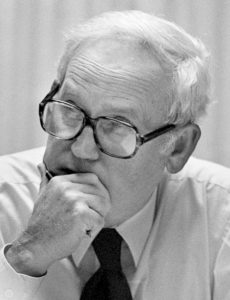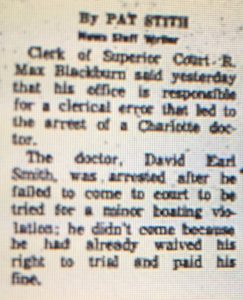Bob Brooks, the managing editor of The New & Observer for most of the 1970’s and 1980’s, could not tolerate an error in an obituary. It was the only time most people’s name appeared in the paper and Brooks hated it when we messed up their obit.
And if we lost an obit?
Unthinkable!

I was the paper’s assistant metro editor for a l-o-n-g eight months and one of my duties was to edited the obits and then moved them from the Metro Desk to the Copy Desk. It was the most important thing I did every day because Bob Brooks told me it was the most important thing I did every day. I handled obits like my life depended on them because, professionally speaking, it did.
One afternoon when I came to work my boss, Bob Gordon, the metro editor, looked at me like I was a dead man walking. In a quiet voice, almost a whisper, he told me that two Raleigh obituaries had been left out of the final edition that morning. They appeared to have been lost. Brooks wanted an explanation.
The metro editor and I both knew there would be hell to pay over those obits, and I was in the hot seat.
But maybe, just maybe, it wasn’t my fault, maybe it was the Copy Desk’s fault. Every night I made a list of the obituaries I sent to the Copy Desk so the first thing I did was check last night’s list. There was no help for me there. The names of the dead men whose obits were not in the paper were not on the obit list either. The Copy Desk was off the hook and I was firmly on it.
I looked everywhere for those obituaries. I checked with each obit writer. No one remembered handling them, they didn’t even remember seeing them.
And then a guy at Brown-Wynne Funeral Home called, told me about obits they would send over that evening and then he told me, almost as an afterthought: the obits they were going to bring would included two they should have dropped off yesterday. Those two obits had been accidentally left on the seat of the car.
Brown-Wynne had not delivered the missing obits!
Feeling a little too smug at my good fortune I went to Brooks’ office and told him what had happened: I didn’t lose those obits. Nobody at The N&O had lost them. It was Brown-Wynne’s fault — they’ve admitted it — the funeral home didn’t deliver them.
That good news appeared to have no effect whatsoever on Bob Brooks. He stood up, walked around his desk, got in my face, and this is what he told me, word for word:
“Two people died in Raleigh yesterday and their obituaries were not in The News & Observer this morning. That is never going to happen again. Do you understand me?”
“Yes sir,” I said.
* * *
And that’s not all.
State Editor Kerry Sipe was responsible for all of the early edition obits and, on another occasion, I heard Brooks explain to Kerry how important they were.
Kerry was an excellent editor, had to be because he had a tough job. Every afternoon and evening he handled news called in by stringers, some of whom were barely literate in my opinion, from various towns across Eastern North Carolina. He had to rewrite most of their copy.
One night after the first edition deadline –we called it the “A” edition– he came over and slumped in a chair beside my desk. It had been one of those days, and he was mentally exhausted.
Brooks came over too, to have a word with Kerry.
“Two Raleigh obits got left out of the ‘A” edition,” Brooks said. When a Raleigh resident had family Down East we ran their obituary in the early, out of town, editions.
Kerry replied, “Yea, I could foresee…
Brooks cut him off mid-sentence.
“Well, let me tell you what I can foresee,” our managing editor said to this man, who had just finished translating reams of gibberish into coherent stories –on deadline. “I foresee that if that ever happens again we’re going to have a new state editor.”
* * *
Brooks was fine newspaperman, a straight arrow who could spot a hole in a story from across the room. I liked him a lot. But he had one blind spot — obituaries.
Coming Monday: You’re Not Bo!
